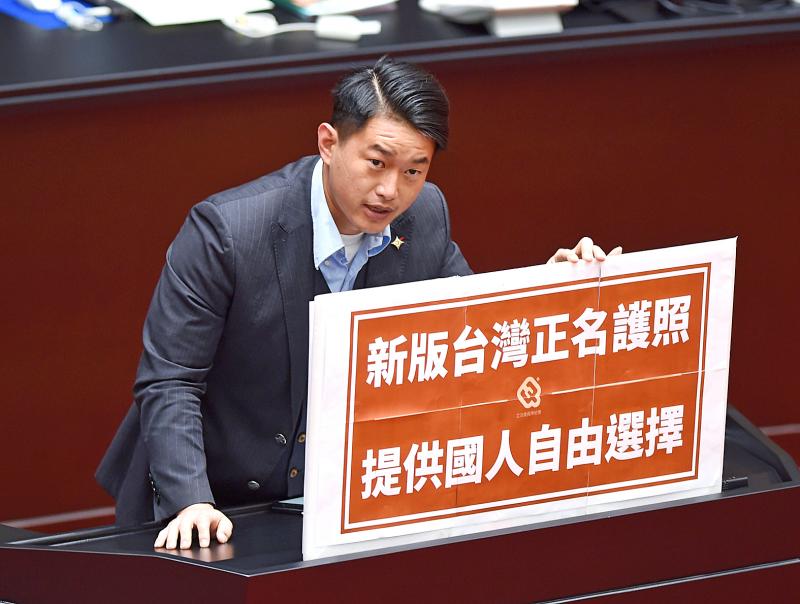The Taiwan Statebuilding Party is drafting a “China relations act” aimed at replacing the “outdated” Act Governing Relations Between the People of the Taiwan Area and the Mainland Area (台灣地區與大陸地區人民關係條例), Taiwan Statebuilding Party Legislator Chen Po-wei (陳柏惟) said yesterday.
The announcement came a day after Democratic Progressive Party (DPP) Legislator Tsai Yi-yu’s (蔡易餘) unannounced retraction of his proposal to remove the wording “unification of the nation” from the existing act from committee review.
Polls since last year have shown that more than 60 percent of the public identify as Taiwanese rather than Chinese or both, and that about 83 percent of respondents younger than 30 consider themselves Taiwanese, Chen wrote on Facebook.

Photo: Liu Hsin-de, Taipei Times
Given the clearly burgeoning Taiwanese identity, lawmakers should make a stand regarding the future they envision for the nation, he wrote.
A well-defined legal framework should be introduced to reflect the self-determination of Taiwanese and showcase the nation’s autonomy, he added.
The Taiwan Statebuilding Party has always advocated that all nations, just as all people, are equal, Chen wrote, adding that he believes the task of reflecting the public’s will should not be encumbered by minutiae such as “timing” or “sequencing” in relation to other events — apparently in reference to Tsai’s remark that he withdrew the proposal because he did not want to create tensions ahead of President Tsai Ing-wen’s (蔡英文) inauguration on Wednesday.
To promote mutual respect and reciprocity, and facilitate perpetual peace and exchanges between the two sides of the Taiwan Strait, the party recommends replacing the “outdated” act with a “China relations act” as a gesture of goodwill, he wrote.
The bill would redefine all matters relating to cross-strait exchanges, as well as reinvent the competent authority for cross-strait affairs, Chen wrote, adding that the party would solicit public comment on how the bill should be drafted.
The party would invite the DPP and opposition parties to debate the bill and encourage them to sponsor their own versions with the aim of making the final legislation as comprehensive as possible, he wrote.
Although the issue is seen as a “hot potato,” Chen wrote that he “did not enter the kitchen to complain about the heat.”
“No one should apologize for their self-identity,” Chen wrote, quoting the president.
However, the People’s Republic of China (PRC) refuses to acknowledge that it is part of the Republic of China, which is the premise of the existing act, Chen wrote.
“Therefore, we would acknowledge that the PRC is a sovereign nation, to spare our neighbor from being oppressed by the nation’s [Taiwan’s] laws,” he wrote, adding that “real love sometimes means setting each other free.”
The controversy will never be resolved if no discussions are initiated, he added.

Right-wing political scientist Laura Fernandez on Sunday won Costa Rica’s presidential election by a landslide, after promising to crack down on rising violence linked to the cocaine trade. Fernandez’s nearest rival, economist Alvaro Ramos, conceded defeat as results showed the ruling party far exceeding the threshold of 40 percent needed to avoid a runoff. With 94 percent of polling stations counted, the political heir of outgoing Costa Rican President Rodrigo Chaves had captured 48.3 percent of the vote compared with Ramos’ 33.4 percent, the Supreme Electoral Tribunal said. As soon as the first results were announced, members of Fernandez’s Sovereign People’s Party

MORE RESPONSIBILITY: Draftees would be expected to fight alongside professional soldiers, likely requiring the transformation of some training brigades into combat units The armed forces are to start incorporating new conscripts into combined arms brigades this year to enhance combat readiness, the Executive Yuan’s latest policy report said. The new policy would affect Taiwanese men entering the military for their compulsory service, which was extended to one year under reforms by then-president Tsai Ing-wen (蔡英文) in 2022. The conscripts would be trained to operate machine guns, uncrewed aerial vehicles, anti-tank guided missile launchers and Stinger air defense systems, the report said, adding that the basic training would be lengthened to eight weeks. After basic training, conscripts would be sorted into infantry battalions that would take

GROWING AMBITIONS: The scale and tempo of the operations show that the Strait has become the core theater for China to expand its security interests, the report said Chinese military aircraft incursions around Taiwan have surged nearly 15-fold over the past five years, according to a report released yesterday by the Democratic Progressive Party’s (DPP) Department of China Affairs. Sorties in the Taiwan Strait were previously irregular, totaling 380 in 2020, but have since evolved into routine operations, the report showed. “This demonstrates that the Taiwan Strait has become both the starting point and testing ground for Beijing’s expansionist ambitions,” it said. Driven by military expansionism, China is systematically pursuing actions aimed at altering the regional “status quo,” the department said, adding that Taiwan represents the most critical link in China’s

‘REALLY PROUD’: Nvidia would not be possible without Taiwan, Huang said, adding that TSMC would be increasing its capacity by 100 percent Nvidia Corp CEO Jensen Huang (黃仁勳) on Saturday praised and lightly cajoled his major Taiwanese suppliers to produce more to help power strong demand for artificial intelligence (AI), capping a visit to the country of his birth, where he has been mobbed by adoring fans at every step. Speaking at an impromptu press conference in the rain outside a Taipei restaurant, where he had hosted suppliers for a “trillion-dollar dinner,” named after the market capitalization of those firms attending, Huang said this would be another good year for business. “TSMC needs to work very hard this year because I need a lot